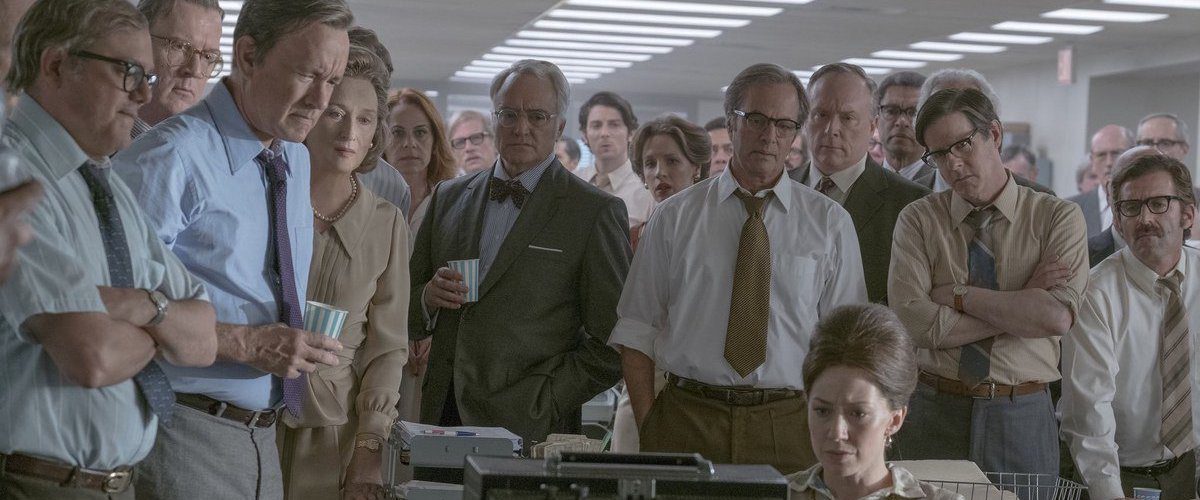The Post is an intelligent, thought-provoking movie that deals with issues considered particularly relevant for our times: The power of the press, freedom of speech, and the media’s influence on public opinion as a force for change. The addressed themes become particularly striking when we consider that the film was almost banned in theaters across Lebanon for director Steven Spielberg’s direct involvement with Israel.
Spielberg also received heat in Lebanon, specifically by Hezbollah, for his financial support of Israel during the July 2006 war. This is not the first time that one of the director’s films has faced censorship. During the screening of his film Tin Tin in 2011, the government went as far as blurring out his name on the the movie’s poster in local theaters across Lebanon.
However, the Minister of Interior ruled against the ban of The Post, and the film was screened last week. This decision was faced with a backlash from Hezbollah with the Iranian-backed politically and military movement’s leader Sayyed Hassan Nasrallah stating,“We reject this decision. We consider this a mistake.”
Based on real events, The Post tells the story of The Washington Post’s role in releasing top-secret government documents known as The Pentagon Papers, which exposed the ongoing deception of the public by the the U.S. government surrounding the unpopular Vietnam War.
The Post raises some interesting points that discuss the importance of a free press in a healthy democracy; and clearly draws parallels between the Nixon and Trump administrations. Like Nixon, President Trump is also threatening the freedom of the press to suppress stories of his own scandals in today’s era of fake news, alternative facts, and unpopular wars.
The film boasts a great ensemble cast which includes Tom Hanks, Meryl Streep, Bob Odenkirk, Allison Brie, Sarah Paulson, Bradley Whitford, and Matthew Rhys. Magic unfolds whenever legendary actors Hanks and Streep are sharing the same scenes, as their verbal sparring does not disappoint.
The performances by the actors is this movie’s strength, with director Steven Spielberg providing an in-depth look at the lives of journalists and the difficulties and struggles they face every day as part of their job to uncover the truth.
Tom Hanks, the multi-award-winning actor known for movies including Forrest Gump, Saving Private Ryan, and Sully, shines as Washington Post Editor Ben Bradlee, who fights enormous odds in the name of journalistic integrity.
Meryl Streep, long considered to be one of the world’s best actresses with the more acting nominations than any other actor in the history of the Academy Awards, provides yet another great performance as the conflicted socialite and publisher, Katherine Graham, who sees the value in high quality news reporting and yet struggles to protect her company from external forces.
Bob Odenkirk also gives an amazing supporting performance as investigative journalist, Ben Bagdikian. Odenkirk is best known as the smooth-talking lawyer Saul Goodman, from the acclaimed TV series Breaking Bad and its spin-off, Better Call Saul.
Gender equality emerges as a secondary theme in The Post, as we witness Streep’s Graham trying to take charge of her newspaper. Despite being the publisher of the paper, Graham is surrounded by men who talk down to her or constantly interrupt her. Streep does not disappoint in portraying another strong woman who fights to take her power back.
Spielberg’s masterful direction does not disappoint. The Post is beautifully shot, with cinematographer Janusz Kamiński incorporating a documentary type feel to give the film a sense of authenticity. The film’s authenticity is also aided by the intelligent depiction of its three-dimensional characters.
Although the story moves at a slow pace at times, the deliberate mechanism is meant to convey the severity of the issue at stake. At other times, The Post takes on a self-righteous tone with overly-sentimental scenes that preach to the audience.
At first glance, there are comparisons to the classic All The President’s Men, which starred Dustin Hoffman and Robert Redford as the investigative journalists who uncover and expose the Watergate Scandal that ultimately leads to the resignation of U.S president Richard Nixon when public opinion turned against him.
The Post is a worthy addition to other notable movies that tackle investigative journalism, such as the aforementioned All The President’s Men and recent Academy Award for Best Picture winner Spotlight. While not quite managing to reach the same great heights, Spielberg directed an intelligent movie that raises interesting discussions of what it means to fight against government censorship in order to protect democracy.
After all, only a free and unrestrained press can effectively expose government deception and hold it accountable.
The verdict: An intelligent, thought-provoking and well-told story.


